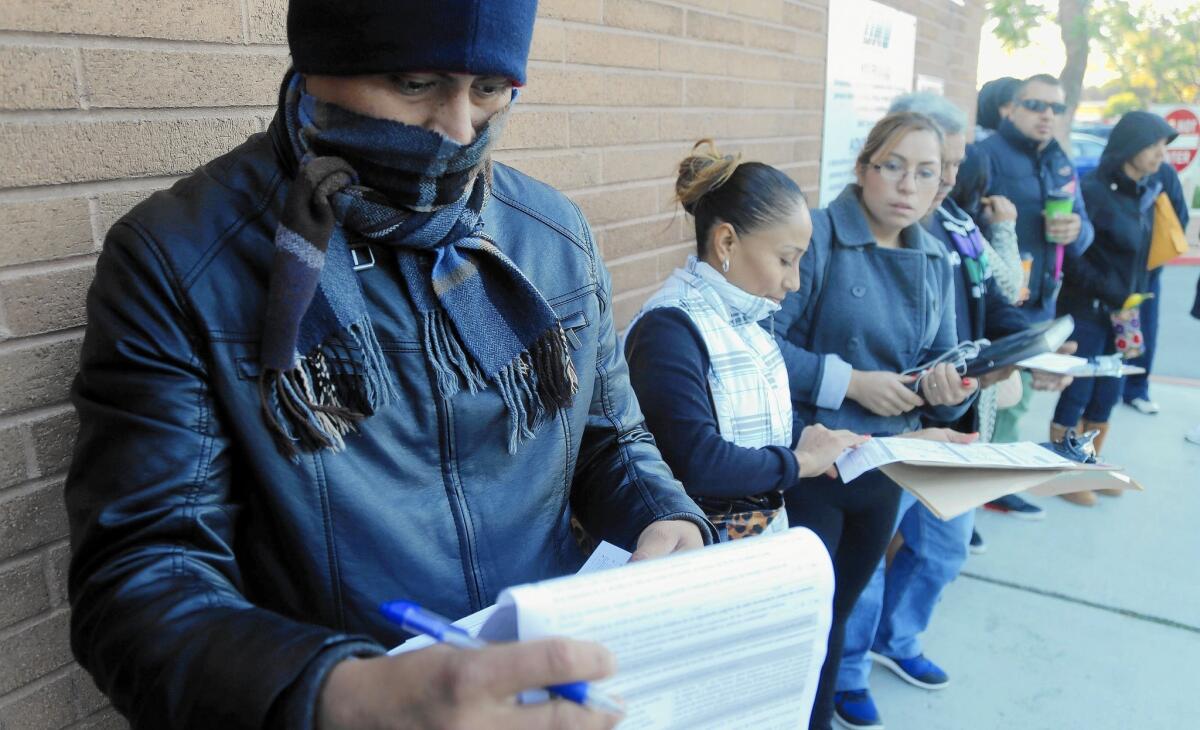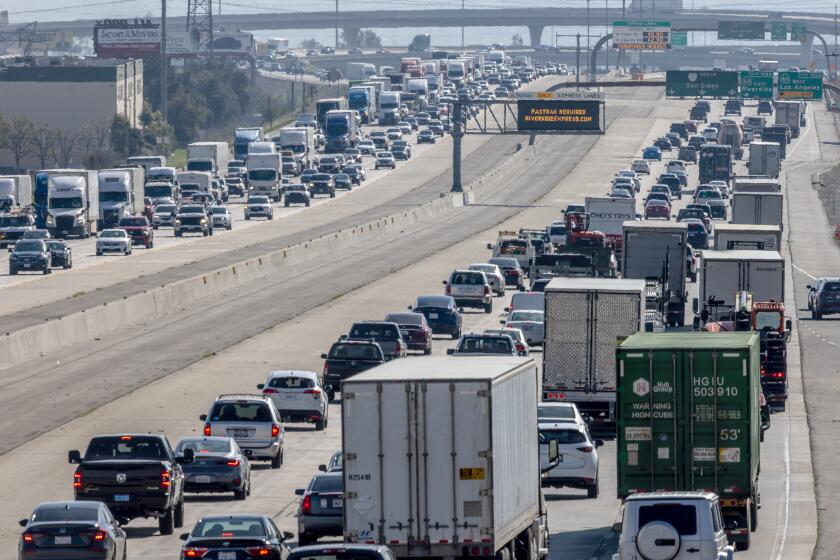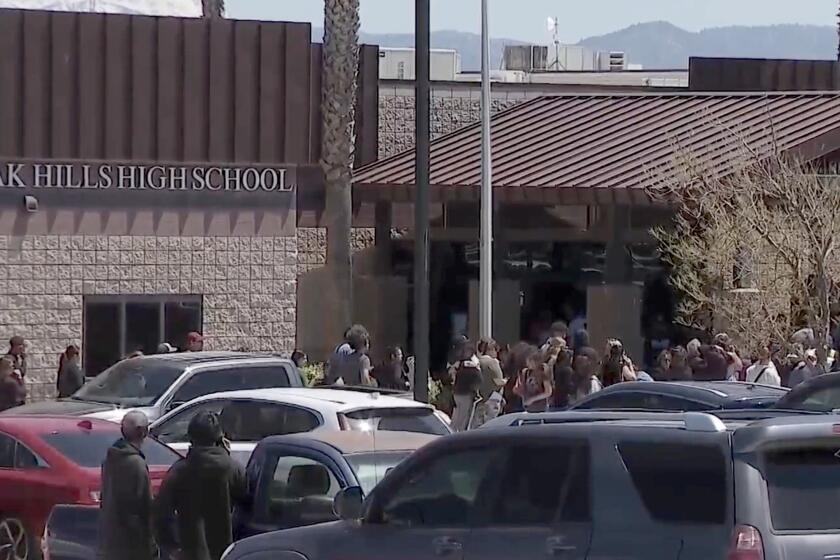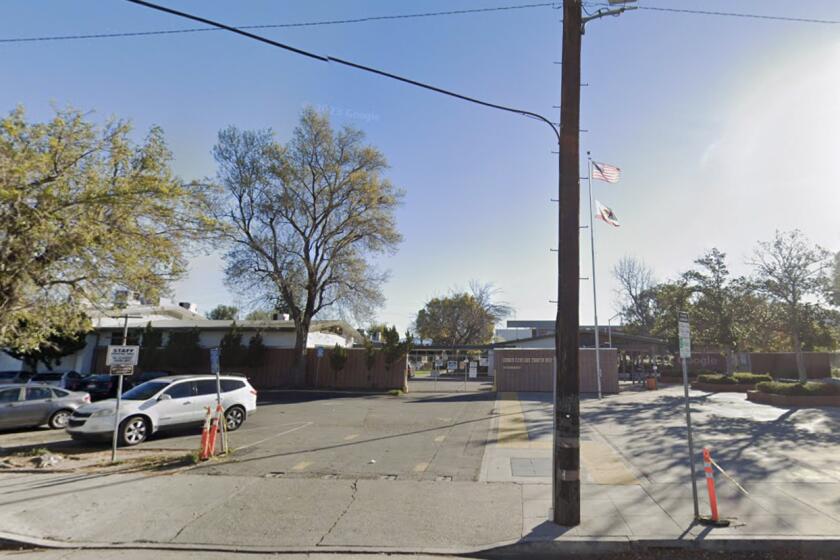Licenses for migrant drivers means more will be insured — in theory

As thousands of immigrants who are in the country illegally queued up Friday to apply for a California driver’s license, supporters of the controversial new law that made the licenses possible predicted a flood of new motorists in the automobile insurance market.
The state Department of Motor Vehicles estimates that 1.4 million immigrants who are in the country illegally may be eligible for special driver’s licenses under AB 60, which Gov. Jerry Brown signed in 2013 and took effect Friday. Many could also be eligible for a new, state-approved, low-cost insurance plan.
Experts say there are no firm figures, but they believe most immigrants who don’t have licenses also do not have automobile insurance.
Opponents of the new law say that because it does not require immigrants to provide proof of insurance when they get a license, there is no guarantee that they will be insured. They also worry that the low-cost insurance plan won’t provide enough coverage for victims in major accidents.
Assemblyman Luis Alejo (D-Watsonville), who wrote AB 60, said that he believes most immigrant drivers — many of whom have been waiting years to get a legal driver’s license — will comply with state law that requires insurance for all vehicles operated in California.
“I expect the vast majority are going to get covered,” Alejo said.
Currently, about 16% of licensed drivers in California don’t have auto insurance, according to Mark Sektnan, president of the Assn. of California Insurance Companies.
Insurance firms across the state have hired additional staff, preparing for a deluge of applicants. They have also launched targeted advertising for the new crop of motorists, Sektnan said.
He could not estimate how many immigrants who get licenses under AB 60 also would get new insurance plans. But Sektnan said some unlicensed immigrants have carried auto insurance for years to protect themselves financially.
Alejandro Albores, a 32-year-old construction worker from Long Beach who has lived in the country illegally for the last 14 years, said he insured his vehicles because it was the right thing to do and he wanted to protect himself in case of a car crash.
Albores was one of many driver’s license applicants who visited the DMV’s Stanton office in Orange County. He said he hoped that, with a license, he wouldn’t have to continue paying such high insurance premiums on his vehicles.
Another applicant, who asked to be identified only as “Carmen” because of her legal status, said she was “really excited” that she had passed the written test at the DMV’s Bellflower office on Friday. The mother, who lives in Long Beach and moved from Mexico 12 years ago, frequently drives her children to school and already carried insurance.
“It is very important because it protects you in case of an accident,” she said.
But insurance isn’t a prerequisite for those applying for a special immigrant driver’s license. They must provide only documents validating their identity and residency in the state, said Jessica F. Gonzalez, a DMV spokeswoman.
Applicants who take the road test for a license must provide proof that the vehicle being used is insured, but they are allowed to use a borrowed car.
That potential “loophole” could allow some newly licensed drivers to get behind the wheel without insurance, said Robin Hvidston, executive director of the group We the People Rising, which opposes AB 60. The Claremont-based group, which supports tough enforcement of laws against illegal immigration, argues the new license law is too expensive for taxpayers and creates opportunity for fraud.
“People in our country illegally are not used to obeying our laws,” Hvidston said. “Just because they are going to get a driver’s card does not mean that they are also going to get auto insurance.”
About 30 people affiliated with Hvidston’s group protested against AB 60 on Friday in front of the Long Beach office of Sen. Ricardo Lara (D-Bell Gardens), a supporter of the bill.
But law enforcement officers, including those of the California Highway Patrol, said they will enforce the insurance requirement.
“Any motorist stopped by a peace officer for a traffic violation is required to present proof of vehicle insurance,” said CHP spokeswoman Fran Clader in a statement Friday.
Those caught driving without insurance can face fines of $100 to $200 on the first offense, plus hundreds more dollars in court fees, and suspension of the vehicle’s registration.
Another new law taking effect this week is expected to boost insurance enrollment. The measure expanded the state’s Low Cost Auto Insurance Program to help eligible motorists who get AB 60 licenses.
The program provides basic liability coverage to meet California requirements, and annual premiums that range from $213 to $472, said Madison Voss, a spokeswoman for the California Department of Insurance, which sponsors the program.
To keep costs low, the coverage is less than what is required for other drivers.
Most drivers must have liability coverage that protects other motorists with $15,000 for bodily injury or death and $5,000 for property damage. The low-cost program’s coverage for those categories is $10,000 and $3,000 respectively, Voss said.
But that amount is insufficient to cover the costs of a major accident, said Don Rosenberg, a Westlake Village resident whose adult son was killed in a car accident involving an unlicensed driver in 2010.
“It’s discriminatory. It’s outrageous,” said Rosenberg, who was among the protesters at Lara’s office.
Information on the low-cost program can be found at https://www.mylowcostauto.com/.
As of 3 p.m. Friday, the DMV had seen 11,000 applicants for AB 60 licenses, officials said. More than a thousand people on Friday checked their eligibility on the Low Cost Insurance Program’s website, Voss said. The program is operated by the California Automobile Assigned Risk Plan.
As more drivers obtain licenses and insurance plans, Alejo predicted that fewer Californians would suffer the financial burden that can result from an accident with an uninsured driver.
“I think this new law will make the roads safer and will better ensure that if there is an accident, everyone is covered by an appropriate insurance plan,” Alejo said.
Times staff writer Cindy Carcamo contributed to this report.
More to Read
Start your day right
Sign up for Essential California for news, features and recommendations from the L.A. Times and beyond in your inbox six days a week.
You may occasionally receive promotional content from the Los Angeles Times.







